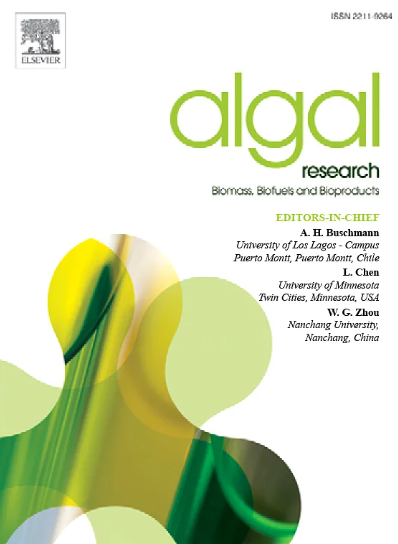比较分析干燥方法对绿藻Caulerpa lentillifera中抗氧化剂、抗糖尿病和抗肥胖活性的影响:体外研究
IF 4.6
2区 生物学
Q1 BIOTECHNOLOGY & APPLIED MICROBIOLOGY
Algal Research-Biomass Biofuels and Bioproducts
Pub Date : 2024-10-22
DOI:10.1016/j.algal.2024.103768
引用次数: 0
摘要
海洋藻类,尤其是蓝藻(Caulerpa lentillifera),作为具有多种健康益处的生物活性化合物的有效来源,已经引起了人们的关注。尽管其生物活性前景广阔,但干燥方法对其健康促进特性的影响仍未得到充分探索。本研究探讨了不同干燥方法对扁豆的抗氧化、抗糖尿病和抗肥胖活性的影响。研究评估了新鲜样品(GACL-FS)以及使用空气油炸法(GACL-AFD)和微波法(GACL-MD)干燥的样品的卡拉胶含量、蛋白质组成和生物活性潜力。GACL-MD 保存了最高水平的蛋白质,而新鲜样品保留了最高的卡拉胶含量。抗氧化试验表明,GACL-MD 样品的抗氧化性能更优越,与 Trolox 标准品相比,它对 DPPH 和 ABTS 的抑制作用明显。同样,抗糖尿病测定显示,所有干燥方法对α-葡萄糖苷酶的抑制作用相当,这表明其具有很强的抗糖尿病特性。通过脂肪酶抑制实验评估的抗肥胖活性突出了 GACL-MD 在较低浓度下的功效,类似于奥利司他,而新鲜样品和风干样品则显示出不同的结果。总之,C. lentillifera 具有作为功能性食品配料的巨大潜力,干燥方法对其生物活性特征有显著影响。微波干燥是保存抗氧化和抗肥胖活性的最佳方法,这强调了需要定制干燥策略来提高营养价值。未来的研究应侧重于优化加工技术和阐明潜在机制,以便在功能食品开发和公共卫生干预中充分利用扁豆的健康促进特性。本文章由计算机程序翻译,如有差异,请以英文原文为准。
A comparative analysis on impact of drying methods on antioxidants, antidiabetes and antiobesity activities in green algae Caulerpa lentillifera: In vitro study
Marine algae, particularly Caulerpa lentillifera (C. lentillifera), have gained attention as potent sources of bioactive compounds with diverse health benefits. Despite its promising bioactivity, the influence of drying methods on its health-promoting properties remains underexplored. This study investigates the impact of different drying methods on the antioxidant, antidiabetic, and antiobesity activities of C. lentillifera. Fresh samples (GACL-FS) and those dried using air-fryer (GACL-AFD) and microwave (GACL-MD) methods were evaluated for carrageenan content, protein composition, and bioactive potentials. GACL-MD preserved the highest levels of protein, while fresh samples retained the highest carrageenan content. Antioxidant assays revealed superior performance in GACL-MD samples, showing significant DPPH and ABTS inhibition compared to Trolox standards. Similarly, antidiabetic assays demonstrated comparable α-glucosidase inhibition across all drying methods, suggesting robust retention of antidiabetic properties. Antiobesity activity, evaluated through lipase inhibition assays, highlighted GACL-MD's efficacy at lower concentrations, akin to Orlistat, while fresh and air-fryer dried samples showed varied results. In conclusion, C. lentillifera exhibits substantial potential as a functional food ingredient, with the drying method significantly influencing its bioactive profile. Microwave drying emerged as optimal for preserving antioxidant and antiobesity activities, emphasizing the need for tailored drying strategies to enhance nutritional benefits. Future research should focus on optimizing processing techniques and elucidating underlying mechanisms to fully harness C. lentillifera's health-promoting properties in functional food development and public health interventions.
求助全文
通过发布文献求助,成功后即可免费获取论文全文。
去求助
来源期刊

Algal Research-Biomass Biofuels and Bioproducts
BIOTECHNOLOGY & APPLIED MICROBIOLOGY-
CiteScore
9.40
自引率
7.80%
发文量
332
期刊介绍:
Algal Research is an international phycology journal covering all areas of emerging technologies in algae biology, biomass production, cultivation, harvesting, extraction, bioproducts, biorefinery, engineering, and econometrics. Algae is defined to include cyanobacteria, microalgae, and protists and symbionts of interest in biotechnology. The journal publishes original research and reviews for the following scope: algal biology, including but not exclusive to: phylogeny, biodiversity, molecular traits, metabolic regulation, and genetic engineering, algal cultivation, e.g. phototrophic systems, heterotrophic systems, and mixotrophic systems, algal harvesting and extraction systems, biotechnology to convert algal biomass and components into biofuels and bioproducts, e.g., nutraceuticals, pharmaceuticals, animal feed, plastics, etc. algal products and their economic assessment
 求助内容:
求助内容: 应助结果提醒方式:
应助结果提醒方式:


